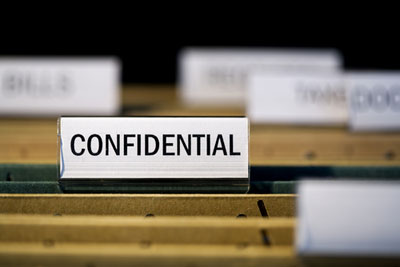It is as commonplace and disconcerting as ordering specialty food at a fast food restaurant and receiving what they commonly serve. You don’t get what you want.
In litigation, product manufacturers, builders and providers of products and ideas are seldom producing background information on those items and ideas without first requiring that the requesting party execute a "confidentiality agreement" which cloaks not only the attorneys and parties, but their experts and consultants as well. These agreements are required as a pre-requisite to the production of any materials which the party required to produce claims is either trademark, proprietary, confidential or trade secret information.
 Further, manufacturers and companies are withholding vital information until the requesting party either executes a confidentiality agreement or seeks an order from the Court compelling the production of this information.
Further, manufacturers and companies are withholding vital information until the requesting party either executes a confidentiality agreement or seeks an order from the Court compelling the production of this information.
In a recent unpublished* California Appeals Court Decision, the Court in Seahaus La Jolla Owners Association vs. Superior Court of San Diego County [San Diego County Superior Court 37-2009-00095253-CU-CD-CTL] [*unpublished decisions can neither be relied upon or cited, but serve as illustration of examining of legal issues] addressed the circumstance of a builder not providing testing data concerning construction materials to a Homeowner’s Association which had sued for construction defect of a condominium project. The Appellate Court in examining the facts of the matter, deduced that the trial court owed a duty to formulate an appropriate protective order based upon the interests of the parties and that ordering a party to execute a confidentiality agreement was an abuse of the trial court’s discretionary powers.
Hence, ultimately, the Court placed the burden on the party demanding the confidentiality order to establish the need and basis for that claim. Reviewing this decision, it would appear that this vision by the Court at the very least requires that the party seeking the claim of confidentiality must take the initiative by seeking a protective order or by providing evidence at a motion to compel, that the confidentiality claims are valid and supported by potential adverse consequences to the party seeking to protect the information.
While the opinion is unpublished and cannot serve as precedent in this area, it nonetheless demonstrates that product manufacturers, builders and providers of products cannot, without substantive proof, immediately assert and require that litigants execute confidentiality agreements as a precursor to obtaining discovery data. The ubiquitous nature of these agreements, which extend to cloak lawyers, agents, experts and consultants, have far-ranging and perpetual ramifications that affect all items produced in discovery and may ultimately prove to be unwarranted if challenged by Court review.



